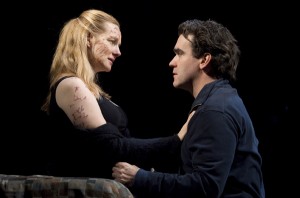Broadway Debut
Last week I had my Broadway premier at the Cort Theatre. I expect it might also be my last appearance on a stage there. Josh Yaffa, an editor at Foreign Affairs, invited me for a “talkback” after the play Time Stands Still. The story chronicles two journalists, a photographer and a writer, who return to New York scarred from covering the conflict in Iraq. The play deals with two interlocking matters — the demise of a relationship and the personal toll of a journalist’s work in the crucible of a war zone.
Two hours of emotional theater about how one couple navigated their relationship and their coverage of the Iraq war sparked a confessional half-hour conversation. Anne Barnard and I moved to Iraq together in 2004, a year into covering the story, and made our first home there. We closed down The Boston Globe Baghdad Bureau in 2006, nearly a year after we married. Our story thankfully doesn’t parallel that of the protagonists of Time Stands Still, but the pressures that warped and ravaged their psyches and relationship felt very familiar.
Josh asked a lot of smart questions of me and the three cast members who joined us on stage, Laura Linney, Brian D’Arcy James and Eric Bogosian. In response to an audience question about embedded journalism, Josh talked about his trip this summer to Chechnya, “embedded” with Human Rights Watch, and he observed that most conflict zone reporting depends on somebody’s help. The real measure of the work depends on how well the journalist contextualizes her work and on who’s hosting the embed.
I’m still unsure of one issue we discussed: can an individual find a healthy balance between war reporting and family life? I can’t generalize about others, but for me almost all work-life balance is cyclical rather than integrated — meaning I alternate periods of frenetic work (or long assignments away from home) with periods of immersion in my family and home. That whiplash is all the more extreme when the work period is in a war zone; and I haven’t covered combat since my son was born in 2008.
The other issue worth mentioning is the question of a reporter’s responsibility. In the play, Laura Linney’s character, the driven photographer, struggles with guilt because she intrudes on the private grief of others. A supporting character also questions the photographer’s role as a bystander, chastising her for passively documenting when she could be actively involved in helping others. Guilt and ambivalence are certainly natural reactions to war, which can dole out suffering indiscriminately, especially if one is a foreign journalist whose presence is voluntary. However, I don’t know of any case in the last decade’s wars where journalists could have helped innocent victims of conflict and instead chose to stand by out of a sense of professional ethics. I’ve seen war photographers in Bint Jbail set down their cameras to carry civilians to ambulances. I’ve seen Western journalists, as well as their Middle Eastern colleagues, give money and major logistical help to sources, passers-by and colleagues. So the binary sense that a journalist has to choose between documentary distance or empathic involvement seems somewhat false.
As for the sense of shame at intruding in the personal grief of others: it’s a very human and very instinctive reaction to chronicling the pain of others. As storytellers with a public platform, though, we’re well aware that we’re not doing our work solely for the subjects of or victims in our tales; at times, we’re not doing it for them at all. The act of bearing witness can be motivated by solidarity, but it is not a collective social act. Sometimes, in war journalism, we’re telling stories for our audiences. If the reason for doing so is sufficiently compelling, then the discomfort or even cruelty of gathering the story is worth it.
Dick Gregory, in his autobiography, recalls the scene at murdered civil rights activist Medgar Evers’ funeral:
The press was there that day, and I remember the way everybody gasped a little when a photographer from Life magazine almost stood on Medgar’s coffin to get a picture of Mrs. Evers. I gasped, too, but when I saw that picture, that beautiful picture of a single tear running down Mrs. Evers’ face, I knew that photographer could have stood inside that coffin and it would have been all right. (p. 190)
A different type of war, but the same questions.
You can listen to the discussion at the Time Stands Still talkback here; scroll down to the third talkback on October 26.
On Assignment in Cairo
Last week I got to Egypt, where I’ll be based for the rest of the month, covering the Arab world for The New York Times. I’ll cross-post my stories here. All ideas and suggestions are welcome.


